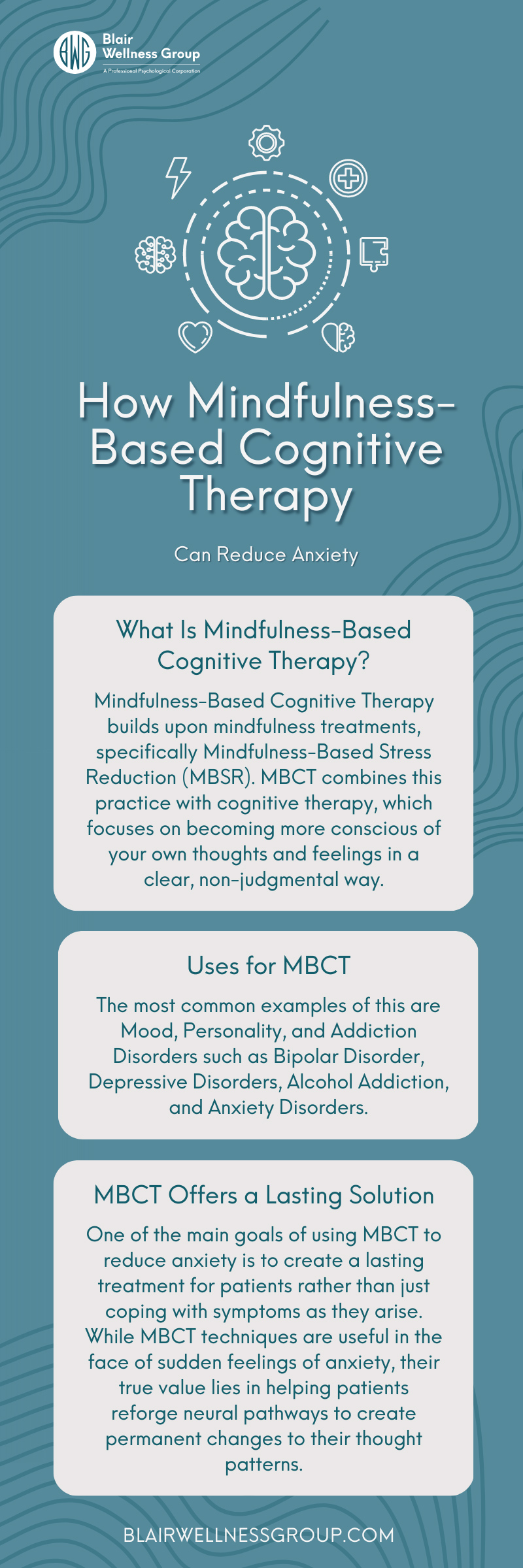Your thought patterns play a huge role in how you feel and behave. That is why positive, productive thought patterns—along with emotional regulation and awareness of behavior patterns—are so integral to mental health.
Licensed Clinical Psychologists have a range of scientific techniques at their disposal to help patients face, understand, and modify their thought patterns in the face of Mental Health Disorders and their mental health symptoms. One such technique is Mindfulness-Based Cognitive Therapy (MBCT), which combines mindfulness practices with the principles of Cognitive Behavioral Therapy.
The goal of this treatment is to bring clarity to inaccurate, spiraling thought patterns so that patients can replace negative thinking with more productive and positive thought patterns. This makes Mindfulness-Based Cognitive Therapy a particularly powerful tool for patients with Anxiety Disorders or anxious thoughts surrounding other Mental Health Disorders. Learn more about how Mindfulness-Based Cognitive Therapy can reduce anxiety with this look into its principles, practices, and uses.
An Introduction to Mindfulness-Based Treatment
To understand Mindfulness-Based Cognitive Therapy, you must first understand what mindfulness is and the role it plays in various treatment plans. When many people think of mindfulness, they think of practices like breathing techniques or yoga. While these activities can certainly work as mindfulness exercises, they are not a necessary part of mindfulness treatment.
At its core, mindfulness is about awareness. Licensed Clinical Psychologists who use mindfulness-based treatments help their patients become more aware of their actions and reactions in any given moment. This includes physical feelings, thought patterns, emotional reactions, and other sensations.
Patients who learn mindfulness can better reflect on these sensations and use their mental clarity to regulate thoughts, emotions, and actions for a more positive outcome. As a result, mindfulness helps patients restructure their thinking and create stronger neural pathways that support healthier, more productive thought patterns. This is a practice for neuroplasticity, which creates new neuro pathways in the brain.
What Is Mindfulness-Based Cognitive Therapy?
Mindfulness-Based Cognitive Therapy builds upon mindfulness treatments, specifically Mindfulness-Based Stress Reduction (MBSR). In Mindfulness-Based Stress Reduction, instructors teach patients how to identify mind-body sensations in a way that allows them to be more present in a moment, thus eliminating feelings of worry and anxiety that cause unnecessary stress.
Mindfulness-Based Cognitive Therapy combines this practice with Cognitive Behavioral Therapy, which focuses on becoming more conscious of your own thoughts and feelings in a clear, objective manner. In short, this treatment allows patients to recognize negative thoughts, feelings, or mood swings, address them objectively, and disengage from the maladaptive thought patterns that result in accompanying behaviors and detrimental actions.
Common Mindfulness-Based Cognitive Therapy Techniques
Restructuring neural pathways in the brain to create more productive thought patterns is not an easy undertaking. It takes time, consistent effort, perseverance, persistence, and ongoing dedication by the patient. For that reason, expert psychologist guide and teach their patients to successfully follow various Mindfulness-Based Cognitive Therapy techniques to build awareness of their own thoughts, feelings, and reactions, so that they can modify them. Some of these techniques include traditional mindfulness practices such as meditation or mindfulness stretching. It is important to note that these practices are most effective under the care and guidance of a Licensed Clinical Psychologist.
Other Mindfulness-Based Cognitive Therapy exercises include the body scan exercise and the three-minute breathing technique. Both of these exercises aim to build awareness of your body and current sensations, which can help ground you in the moment and disrupt negative or spiraling thoughts with clear, non-judgmental thinking.
Uses for Mindfulness-Based Cognitive Therapy
Because Mindfulness-Based Cognitive Therapy revolves around replacing negative and maladaptive thought patterns with positive and functional thoughts. This has been proven to be an effective treatment for Mental Health Disorders that create negative and detrimental thought patterns in the first place. The most common examples of this are Mood Disorders, Personality Disorders, and Addiction Disorders such as Bipolar Disorder, Depressive Disorders, Anxiety Disorders, Borderline Personality Disorders, Gambling Addiction, Social Media Addiction, Porn Addiction, Shopping Addiction, and Alcohol Addiction.
Anxiety Disorders are a prime example of this. Individuals with anxiety or a history of Anxiety Disorders develop negative cognitive processes that become their automatic reaction to distress or daily stressors. Anxiety Disorders also weaken neural pathways, making it harder to overcome these negative patterns. As a result, it is easy to succumb to debilitating feelings of worry or stress. With Mindfulness-Based Cognitive Therapy, though, Licensed Clinical Psychologists focus on helping patients restructure these cognitive processes and build stronger neural pathways. This, in turn, creates a healthier, more productive response to distress, preventing negative thought spirals and other debilitating symptoms of anxiety.
Mindfulness-Based Cognitive Therapy Offers a Lasting Solution
One of the main goals of using Mindfulness-Based Cognitive Therapy to reduce anxiety is to create a lasting treatment for patients rather than just coping with symptoms as they arise. While Mindfulness-Based Cognitive Therapy techniques are useful in the face of sudden feelings of anxiety, their true value lies in helping patients reforge neural pathways to create permanent changes to their thought patterns.
In addition to teaching patients to overcome current challenges, this also helps avoid relapses and other future issues. Furthermore, building more productive cognitive processes gives patients greater mental resilience against other Mental Health Disorders, helping prevent comorbid conditions and the development of future problems.
Mindfulness-Based Cognitive Therapy vs. Cognitive Behavioral Treatment
Mindfulness-Based Cognitive Therapy and Cognitive Behavioral Treatment (CBT) have a lot of overlap. Cognitive Behavioral Treatment often uses mindfulness practice as a method for identifying and reflecting on negative patterns. However, Cognitive Behavioral Treatment also includes practices like guided discovery and problem-solving skills to correct maladaptive behaviors.
As with many types of mental health therapies, Cognitive Behavioral Treatment and Mindfulness-Based Cognitive Therapy work well together in a multi-faceted treatment approach. With both forms of treatment, Licensed Clinical Psychologists can instill in patients a deeper understanding of how their thought processes work, what negative cognitive patterns look like, and how they affect thoughts, feelings, and behaviors. With this knowledge, patients gain a better chance of restructuring their negative thought patterns and forming healthier habits for positive, long-lasting change.
Expert, Lasting Anxiety Treatment
Anxiety Disorders and mental health illnesses do not have to take over your life. With expert treatment from a Licensed Clinical Psychologist, you can establish better control over your thoughts, feelings, and behaviors and create a more positive mindset for yourself.
At Blair Wellness Group, Dr. Blair has experience in a comprehensive range of evidence-based therapies. If you are looking for an anxiety therapist in Irvine, Newport, Orange County, Huntington Beach, Laguna Beach, Corona Del Mar, Dana Point, Mission Viejo, Aliso Viejo, Beverly Hills, Bel Air, Century City, Brentwood, or Westwood, reach out today. Our personalized, compassionate approach will help you overcome the challenges of anxiety and regain control over your day-to-day life.















